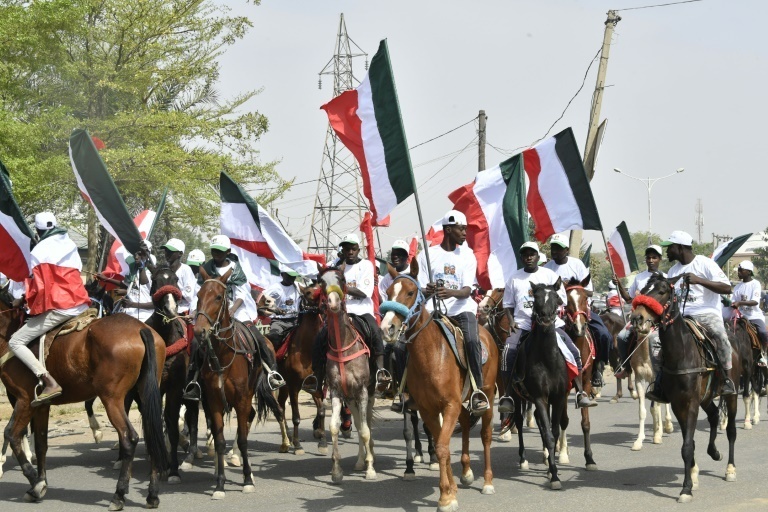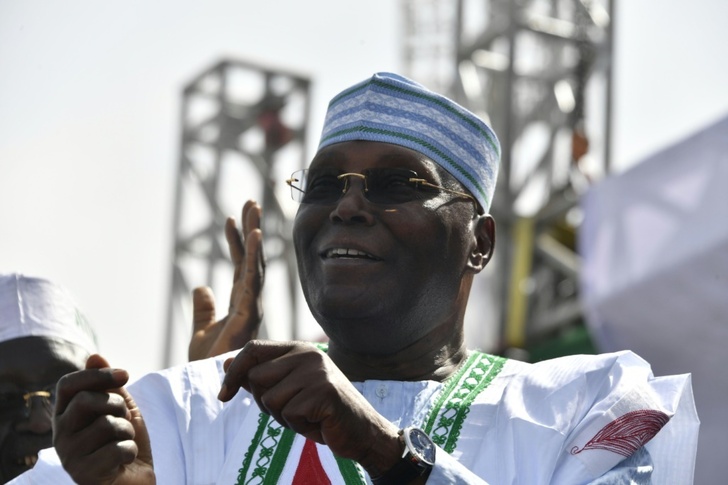The first time Atiku Abubakar ran for Nigeria's presidency, his country was still under military rule and Nelson Mandela was about to win a Nobel prize for ending apartheid.
Three decades later, Abubakar is attempting his sixth run for the presidency, touting his experience as vice president and his business acumen to "rescue" Africa's most populous democracy.
Nearly 100 million Nigerians are registered to vote for the successor to President Muhammadu Buhari on February 25, with the country struggling with insecurity from jihadists and criminal gangs, increasing poverty and economic fallout from the Ukraine war.
Commonly known as "Atiku", Abubakar, 76, is running for the main opposition Peoples Democratic Party (PDP) in a tight race against the ruling All Progressives Congress (APC) party hopeful Bola Tinubu and Labour Party's Peter Obi.
As the PDP candidate arrived in an open-air bus at a rally last week in the northern city of Kano, salesman Oladipo Abodunmin said Abubakar was the man to put Nigeria on track.
"I have seen what he has done, when he was the vice president," he said.
Chants of "Goodbye APC, Goodbye APC" rang out in the stadium where some waved the PDP's flags or banners saying: "Just a few steps more father Atiku."
Can one of the country's most experienced politicians finally snatch the presidency after multiple failed attempts?
Abubakar is a political veteran with a strong, national party network, analysts and supporters say. Next week's three-way race offers him a better chance than in 2019 when he faced off against incumbent Buhari.
"He has a lot of advantages this time round," said Kabiru Sufi, a public affairs lecturer at Kano State College. "Instead of facing one strong candidate, he is facing two or three."
- Graft allegations -

Eight years of Buhari's government has also offered the PDP a chance to present itself as a renewed force, party leaders say.
But experts said Abubakar may struggle to capture the younger electorate -- most of the nearly 10 million newly registered voters this year are under the age of 34.
Dogged by accusations of corruption, which he repeatedly denies, and with decades in politics, Abubakar must shake off an image as an oldguard politician with little new to offer.
The PDP governed Nigeria for a decade and a half from the end of military rule in 1999 until 2015 when the new alliance APC succeeded in getting Buhari elected.
This time, the PDP chief campaigned on a programme of security, economic revival, national unity and to devolve more power -- a popular but sensitive theme in a country where ethnic tensions often flare.
"Today we have a disunited country, today we have the gravest economic challenges as well as security challenges," he said during a speech.
"We need people who have the experience, who have the competence, and who have the record."
- Party disunity -
APC rivals have been quick to link Atiku's name to graft accusations from the past.
While he was vice president, he oversaw the privatisation of badly managed state firms, but critics accused him of profiting on the side. He has always denied any charges and was never convicted.
His campaign portrays him as a "rags to riches" success with investments in oil and gas and port services.
But Labour Party's Obi, who is challenging APC and PDP's long dominance, will likely drain votes from PDP's strongholds in the south of the country, analysts said.
More damaging though maybe is the split with the powerful PDP governor of southern Rivers State, one of the top four states by number of voters.
Choosing northerner Abubakar, the PDP broke with an informal agreement that the presidency should rotate between the north and the south, in an unofficial power-sharing deal.
After northerner Buhari, many southerners expected a candidate from their region. Some PDP southerners feel Abubakar upset the party balance.
"This sentiment favours two other contenders, Bola Ahmed (Tinubu) and Peter Obi," SBM Intelligence said in a recent analysis.
But recent cash shortages after a central bank programme to replace old naira notes with new ones have angered voters -- becoming another factor in the election as the PDP and APC spar over the blame.
"With elections in Nigeria, it is not over until it is over," said Kano lecturer Sufi. "Anything can happen to give any of the popular candidates an edge."
pma/lhd/cw
© Agence France-Presse
Your content is great. However, if any of the content contained herein violates any rights of yours, including those of copyright, please contact us immediately by e-mail at media[@]kissrpr.com.
Source: Story.KISSPR.com

